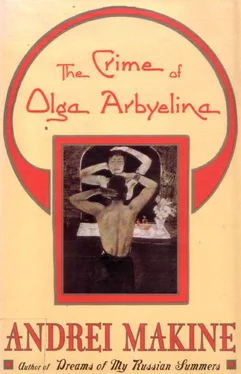Everyone in Villiers-la-Forêt (the men perhaps more openly than the women) wanted it to be a murder. This theory corresponded to some inescapable cliché of the imagination on the part of people who had very little, to the classic scenario of a crime of passion. Or, much more simply, to a desire to picture two naked bodies, first of all joined in love and then separated by the violence of a brief struggle and death.
Fascinated, abnormally perceptive, the townspeople held forth about the crime, invented new theories about it, and were critical of the inquiry that was making no headway. But it was really the bodies that fascinated them. For all at once their appearance amid the sleepy rural calm of Villiers-la-Forêt had to be accepted; and their nakedness, whether erotic or criminal, had to be written into the record of those idle July days that smelled of dust baked in the sun and the warm mud of the river. For such was the soft, slow landscape they burst in on: the man, his clothes drenched, stretched out on the bank, his skull smashed in. And the woman with disordered, streaming hair, her breasts bare, a woman seated beside the dying man, as still as carved stone.
It was thus that the scene had been reported by a breathless witness-the man with a stammer whom the people of Villiers called "Loo-loo," on account of his everlasting "loo-loo-look," the introductory phrase that enabled him to embark on a conversation. This rime he was so overwhelmed that his stuttering lasted longer than usual. The men on the little terrace of the Café Royal eyed him with indulgent smiles, the younger men began to parody him. His efforts and their mockery brought tears to his eyes. The combination of this frailty and his defective speech caused him to be taken for a simpleton. He managed to overcome the strangulation of his "loo-loos" sufficiently to alert the men to the presence of the two bodies beside the river. It was his tortured expression that convinced them. They got up and followed him, as you follow the barking of a dog that despairs of conveying the urgency of its summons.
For several minutes on the bank they were blinded. Everything around them was so radiant on this fine summer's afternoon. A heat haze enveloped the willow thickets in a soft, milky light. The water with flat glittering patches rippled under the tiny promontories of plants that overhung its flow here and there. The soft and dreamy sound of it made you want to stretch out in the grass and listen distractedly to the sparse notes of the birds, to the distant crowing of the cocks that carried all the way to this spot, as if better to measure its whole summery expanse. A hundred yards away a fisherman was casting his line. Even farther away along the bank you could see the old brewery building, all garlanded in strands of hops. And more distant still, toward the horizon, the first houses of the lower town clustered together; then, climbing above them, the familiar roofs of the upper town-with the dark point of the steeple, the green mass of plane trees above the station and the place where the road turned off to Paris.
People were arriving, alerted who knows how, greeting one another with furtive little nods; and the whole crowd, composed of neighbors, acquaintances, and relations, froze before this inconceivable sight: a man lying there with a broad brown mark on his bald head, his mouth open, his eyes glassy; and a woman seated on a great worm-eaten tree stump, washed up by the river, a woman whose beauty and lack of modesty hurt your eyes.
And this was the sensation experienced by everyone on that bank. An ocular discomfiture, as if an eyelash had slipped under your eyelid and blurred your vision. This dead man whom no one dared to touch before the police arrived, this woman with her breasts scarcely hidden by a few shreds of cloth-two extraterrestrials landed on this day in the summer of 1947, the summer which all the newspapers had proclaimed to be that of "the first real vacation of peacetime."
Amid this uneasy stasis a movement was finally made that broke the spell. An old lady bent forward and removed a long, fine strand of waterweed that clung to the dead man's brow. Releasing all its pent-up energy, the crowd erupted into an angry hissing: nothing must move before the police got there! And at last it became clear to them that the whole scene really was happening. In a book, as several people remarked, everything would have been resolved much more quickly. But in the reality of that banal July day there was this long wait, extending absurdly beyond any acceptable limit. There was the strand of weed and the shirt that finally dried on the victim's body. Groups formed; words even more pointless than usual were uttered; "Loo-loo" wept; the men directed increasingly bold stares at the half naked breasts of the unmoving woman. And when they managed to tear their eyes away from the drowned man, with his face covered in duckweed, to which they were attracted, as if magnetically, it was the figure of the postman on his bike that could be seen in the distance. Such was the nauseating equanimity of real life, that has no concern with plot development and often actually ruins it with its glutinous slowness.
This ponderousness of reality also extended as far as the identification of the couple. "But that woman," many were to murmur. "I've seen her hundreds of times! You know, she works in the library at that Russian old folks' home… That's it. She's the one who came to Villiers later than the others, just before the war…"
As for the man, they recognized him as the elderly Russian who could sometimes be seen bent over a little vegetable garden that sloped down to the river. A man of few words who lived unobtrusively His mouth, currently wide open, seemed like life's last joke at the expense of his taciturn character.
A few Russians among the crowd were also eager to contribute to the identification of the two individuals. So it was that in the whispering that passed from one group to another, the name of Olga Arbyelina came to be disclosed. Then that of Sergei Golets. With these titles: Princess Arbyelina; Golets, former officer in the White Army. For the French townspeople such minutiae had the old-fashioned ring of titles like "Marquis" and "Vicomtesse" in a forgotten play of the romantic era. They paid much more attention to the young fisherman. He came running up holding a shoe that was missing from Golets's left foot. Nobody knew what to do with the shoe… As before, they could hear the rippling of the warm water, the distant crowing of cocks. And, without knowing how to formulate it, some of them were struck by this disconcerting thought: So, if it were me stretched out on the ground there, with my mouth open, instead of this poor Russian, yes, if like him I had just died, it would have had no effect on the sunshine, the grass, the lives of all these people, their Sunday-afternoon walk. This warm, sunny posthumous world, smelling of reeds and waterweed, seemed more terrifying than any hell. But there were very few to pursue this line of thought to its logical conclusion. In any case, the police were arriving at last.
The disquiet provoked in the people of Villiers by the excessive radiance of the day that had greeted the tragedy on the riverbank faded away with the first stages of the inquiry. Now they all turned to reconstructing the facts, but setting off in the opposite direction from that chosen by the investigating magistrate. He was seeking to discover if there had been a crime or not. For them, the murder was not in doubt. Thus all they had to do was to yoke together as a pair of lovers the man and woman they had come upon one Sunday in July thanks to Loo-loo. And it was the challenge of this emotional and physical pairing that set all their brains in a ferment at Villiers-la-Forêt. For, as with those married couples who provoke the question: "What on earth brought them together?" it was impossible to imagine a conjunction between two more dissimilar natures.
Читать дальше












